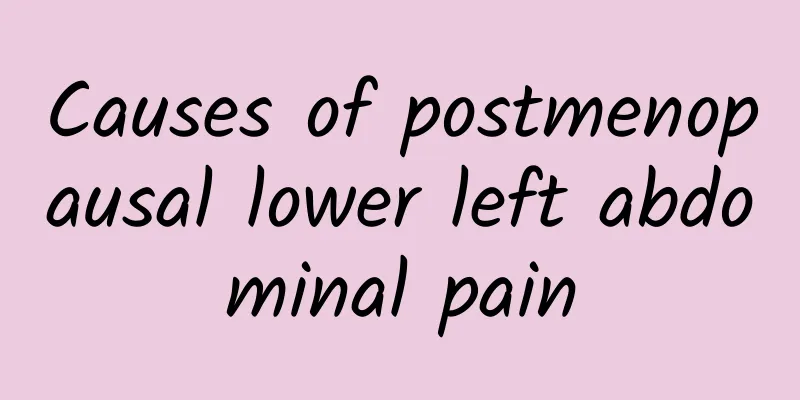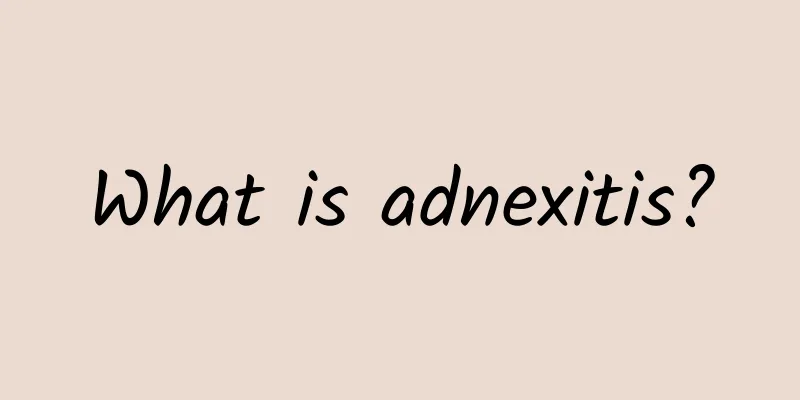Causes of postmenopausal lower left abdominal pain

|
Postmenopausal dull pain in the lower left abdomen may be caused by cold, dietary stimulation, enteritis, pelvic inflammatory disease, vaginitis, etc. It is recommended to seek medical attention in time and take appropriate improvement or treatment measures under the guidance of a doctor. The details are as follows: 1. Get cold: Menopause is a permanent state of no menstruation caused by ovarian dysfunction. If a woman's abdomen is stimulated by cold, it may cause local dull pain. You need to keep warm. You can use a hot towel to heat the abdomen to help improve it. The water temperature should not be too high to avoid skin burns. 2. Dietary stimulation: If you do not pay attention to your diet after menopause and often eat greasy or spicy foods, such as sweet cakes and chili peppers, it is easy to increase the digestive burden and cause symptoms such as lower abdominal pain, bloating or nausea. This can be improved by massage. You need to use your palm to massage the lower left abdomen clockwise, which can promote blood circulation, intestinal peristalsis and digestion, and relieve pain. 3. Enteritis: It may be caused by unhygienic diet, leading to intestinal infection, intestinal inflammation, and thus causing symptoms such as left lower abdominal pain, diarrhea or fever after menopause. You can use drugs such as Bifidobacterium Tetravalent Live Bacteria Tablets, Levofloxacin Hydrochloride Tablets, Amoxicillin Capsules, etc. for treatment according to the doctor's instructions, which can regulate the intestinal flora and have antibacterial effects. 4. Pelvic inflammatory disease: Most cases are caused by pathogenic bacteria infection due to poor personal hygiene, which can cause pelvic inflammatory reactions in women, accompanied by symptoms such as lower abdominal pain, fever, and increased vaginal discharge. It is necessary to use drugs such as roxithromycin capsules, azithromycin tablets, and cefixime dispersible tablets under the guidance of a doctor to treat it, which can play an anti-inflammatory role. 5. Vaginitis: Postmenopausal women suffer from vaginitis, which is usually caused by infection, dysbacteriosis, hormone stimulation, etc., which can cause abnormal vaginal discharge, vaginal itching or burning sensation, accompanied by lower abdominal pain. It is necessary to use drugs such as metronidazole effervescent tablets, Kangfu ointment, and metronidazole tablets under the guidance of a doctor to improve vaginitis caused by sensitive bacteria. In addition, it may also be caused by uterine fibroids or ovarian cysts. Take good care of your gynecology, change clean underwear every day, avoid bacterial infection, and go to the hospital for regular gynecological examinations. If you find that you have a disease, you need to treat it in time. |
<<: What is the normal thickness of the endometrium?
>>: What causes headaches after ectopic pregnancy surgery?
Recommend
Unexpected benefits of black coffee: Helps burn fat
It is no longer just a favorite of young intellec...
Expert introduction: There are many misunderstandings in treating cervical erosion
What are the main misconceptions about cervical e...
Dissatisfied with the bill to smuggle American beef, the opposition party threatened to boycott it for a long time
Opposition legislators were dissatisfied with the...
That one can also be very active! Create a 28-day jogging plan for yourself
Many women must have had similar questions: when ...
What causes pelvic inflammatory disease? The causes are completely different
The incidence of pelvic inflammatory disease is r...
Is cervical precancerous lesion cancer?
Everyone must be familiar with cervical cancer. S...
What drugs are effective in treating endometrial tuberculosis?
We all know about endometrial tuberculosis. The i...
Woman with abdominal distension and abnormal leucorrhea
Women's abdominal distension and pain accompa...
Fasting to lose weight and reduce body fat is not just about 168! A complete guide to 7 fasting methods, with 6 points to make fasting more effective
There are many different ways to do intermittent ...
How to differentiate and diagnose left ovarian cyst and what are its symptoms
Ovarian cyst is a relatively complicated disease ...
Will there be abnormal vaginal discharge after having the IUD inserted?
Abnormal vaginal discharge may occur after the IU...
Want to lose weight in your heart and enjoy it with your mouth? Every sentence hits the nail on the head, giving you the cruelest wake-up call for those who keep shouting about losing weight.
Being good-looking at 20 is luck, but being good-...
People over 40 have bloated bellies and short lives, exercise to lose fat and prevent stroke
My father is busy at work and has many social eng...
How to confirm ovulation bleeding
Ovulation bleeding usually refers to a small amou...
The most effective foods for women to regulate menstruation Three foods to regulate menstruation
Women have menstruation every month, and the amou...









